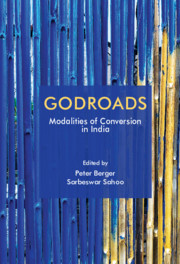Book contents
- Frontmatter
- Contents
- Foreword
- Acknowledgements
- Introduction
- 1 The Rise, Growth and Significance of Shudra Conversion Movements in the Methodist Mission, Hyderabad, 1925–1947
- 2 Communism and the Cross: A Caste–Class Trajectory of Religious Conversion in South India
- 3 Religious Conversion as Ethical Transformation: A Study of Islamic Reformism in Rural West Bengal
- 4 Conversion versus Unity: The Basel Mission among the Badaga on the Nilgiri Plateau, 1845–1915
- 5 Identity Change and the Construction of Difference: Colonial and Postcolonial Conversions among the Sumi Naga of Nagaland, Northeast India
- 6 Conversion to Christianity and Healing: The Naga of Northeast India
- 7 Reshaping the American Evangelical Conversion Narrative in Nineteenth-Century North India
- 8 Cultural Transformations through Performance Arts in Early Twentieth-Century South India
- 9 Reservation and Religious Freedom: Understanding Conversion and Hindu–Christian Conflict in Odisha and Rajasthan
- 10 Rupture and Resilience: Dynamics between a Hindu Reform Movement and an Indigenous Religion in Highland Odisha
- Afterword: India Seen from Amazonia
- About the Contributors
- Index
Foreword
Published online by Cambridge University Press: 24 April 2020
- Frontmatter
- Contents
- Foreword
- Acknowledgements
- Introduction
- 1 The Rise, Growth and Significance of Shudra Conversion Movements in the Methodist Mission, Hyderabad, 1925–1947
- 2 Communism and the Cross: A Caste–Class Trajectory of Religious Conversion in South India
- 3 Religious Conversion as Ethical Transformation: A Study of Islamic Reformism in Rural West Bengal
- 4 Conversion versus Unity: The Basel Mission among the Badaga on the Nilgiri Plateau, 1845–1915
- 5 Identity Change and the Construction of Difference: Colonial and Postcolonial Conversions among the Sumi Naga of Nagaland, Northeast India
- 6 Conversion to Christianity and Healing: The Naga of Northeast India
- 7 Reshaping the American Evangelical Conversion Narrative in Nineteenth-Century North India
- 8 Cultural Transformations through Performance Arts in Early Twentieth-Century South India
- 9 Reservation and Religious Freedom: Understanding Conversion and Hindu–Christian Conflict in Odisha and Rajasthan
- 10 Rupture and Resilience: Dynamics between a Hindu Reform Movement and an Indigenous Religion in Highland Odisha
- Afterword: India Seen from Amazonia
- About the Contributors
- Index
Summary
This is an important and original collection. Scholarly approaches to conversion generally focus on Christianity, seeing conversion as a distinctive feature of that religion in accordance with its own rhetoric. Christianity then appears as something one converts to from something else, often tracing a trajectory from polytheism to monotheism with an apparent teleological inevitability.
Numerous historical and anthropological studies, from early Europe (Brown 1995; Burke 1978) to modern Africa (Meyer 1999) and Papua New Guinea (Robbins 2004), confirm that this kind of shift does indeed happen. But the chapters in this collection show that it is not the only possible journey. Western Europe is the point of origin of much colonialism and many missionaries, yet today people there are turning away from Christianity, which is in serious decline across the region. For India, this volume shows clearly how conversion is not only a story about Christianity – or even about conversion as such. Religious change takes place across Islam, Hinduism and Buddhism, as well as in India's numerous tribal religions. One of this book's important contributions, both theoretical and ethnographic, is to show how the same kinds of shifts can also occur right inside what is considered to be one and the same religion, where they manifest themselves as reformist movements. And Chapter 7 explores a deeply spiritual figure who moves between Muslim, Hindu and Christian devotional forms. Such situations are not so much examples of conversion, as of something that could perhaps be called religious adjustment.
Many religious discourses talk of a road or path. In religious terms, these seek a destination so other-worldly that it can perhaps never be reached. The roads in the title of this book refer to journeys with no end point, but for a different reason. They are also a historical and sociological metaphor. For a while, sometimes for generations, a community may feel static, with little change. Then, the pressure for change will build up, and the metaphor of a journey will again seem appropriate.
The chapters in this collection survey a wide range of historical and contemporary situations across the country. The picture that emerges is highly interactive, as local situations are impinged upon by a range of influences, triggering reactions and counter-reactions: missionaries, communists, Dalit liberationists and prophets emerge from or are met by the agency, agendas and cultural depth of diverse populations.
- Type
- Chapter
- Information
- GodroadsModalities of Conversion in India, pp. vii - xPublisher: Cambridge University PressPrint publication year: 2020

